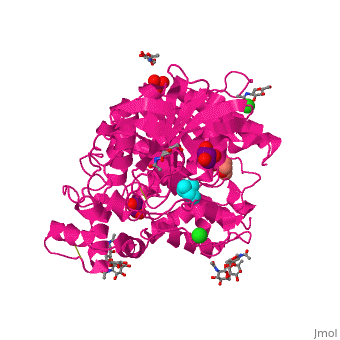Function
Butyrylcholinesterase (BChE) is an enzyme widely distributed throughout the body in humans, but particularly prevalent in serum, where it occurs as a tetramer of catalytic subunits. It is distinguished from the homologous enzyme, acetylcholinesterase, by its ability to hydrolyze the non-natural substrate butyrylcholine as well as the neurotransmitter, acetylcholine.
Relevance
BChE finds medical use as a bioscavenger for overcoming organophosphate (OP) nerve agent and insecticide intoxication by interacting rapidly with the toxic agents.
Disease
BChE biological role remains obscure, but mutations in the human BCHE gene result in prolonged post-surgical apnea due to the inability of the mutant BChEs to hydrolyse the local anaesthetic, succinylcholine.

